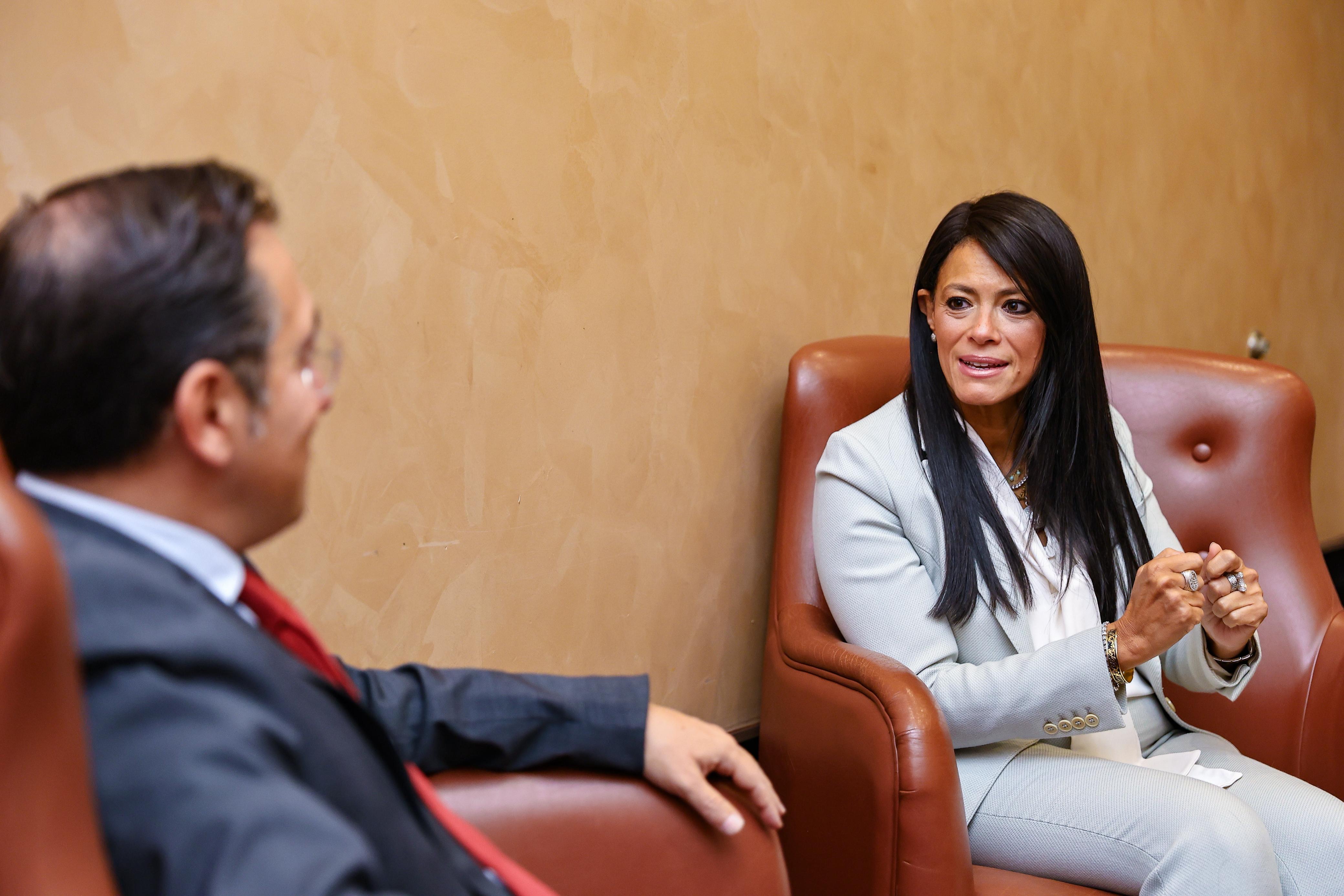• Dr. Rania Al-Mashat: The Partnership for Sustainable Development Program (2025–2030) is a turning point in the continuous path of close cooperation between Egypt and Spain.
• We look forward to further expanding Egyptian-Spanish relations in terms of economic development, trade, and investments… 95% of wind farms in Egypt were implemented by Spanish companies.
• Egypt’s Narrative for Economic Development: Reforms for Growth, Jobs & Resilience works to maximize the benefits of advanced infrastructure to enhance the competitiveness of the economy and redefine the role of the state in economic activity.
• Providing all forms of support to Spanish companies operating in Egypt, along with maximizing their benefit from financing tools through international cooperation mechanisms.
• 95% of wind power farms in Egypt were implemented by Spanish companies, and we look forward to increasing and diversifying investments.
• Egypt is moving forward with its economic reform path, strengthening its focus on the most productive sectors and taking further measures to attract foreign investments.
• Discussions on the progress of the implementation of the National Structural Reform Program and measures to complete the second phase of the Macroeconomic Support and Budget Assistance Mechanism.
Following the signing of the Egypt–Spain Partnership for Sustainable Development Program 2025–2030, H.E. Dr. Rania Al-Mashat, Minister of Planning, Economic Development and International Cooperation, held a bilateral meeting with H.E. Mr. José Manuel Albares Bueno, Minister of Foreign Affairs, European Union and Cooperation of the Kingdom of Spain, to explore ways to enhance joint cooperation between the two countries.
During the meeting, the Minister welcomed the high-level and historic visit of H.M. King Felipe VI of Spain to Egypt, emphasizing that the visit reflects the deep historical ties between the two countries and the keenness of H.E. President Abdel Fattah El-Sisi, President of the Arab Republic of Egypt, to strengthen friendship and joint relations with the Kingdom of Spain. This, she noted, opens new avenues of cooperation in the fields of economy, trade, and investment, in line with the development priorities of both countries.
The two sides discussed the latest developments in joint cooperation between Egypt and Spain. In this context, the Minister applauded the Partnership for Sustainable Development Program (2025–2030), describing it as a comprehensive framework for multi-sectoral cooperation focusing on inclusive social and economic development, women’s empowerment, and environmental sustainability. They also explored how to maximize the benefits of the Egypt–EU Investment Guarantee Mechanism, valued at €1.8 billion, to support private sector participation in priority projects, noting the growing interest of Spanish companies in investing in energy and water desalination.
H.E. further highlighted that Egypt and Spain are working together to implement several upcoming projects, including financing projects for medical supplies and pharmaceutical exports, supporting the development of a small and medium-sized enterprise (SME) and entrepreneurship strategy in cooperation with the Micro, Small, and Medium Enterprise Development Agency (MSMEDA), financing training programs for Egyptian public prosecutors at the Spanish Judicial School (2025–2030), funding the second phase of the project to enhance the participation of youth and SMEs in production clusters, as well as projects related to the Carbon Border Adjustment Mechanism (CBAM).
The Minister noted that the Spanish Agency for International Development Cooperation (AECID) has been a longstanding partner to Egypt for more than 20 years, with the development cooperation portfolio between Egypt and Spain (2020–2024) amounting to approximately $867 million, financing nine projects. The current portfolio amounts to approximately €362 million to finance eight projects in transport, governance, irrigation, women's empowerment, youth, and the environment, in addition to other projects implemented by the Spanish agency in partnership with United Nations agencies and civil society organizations.
H.E. also reviewed the key pillars of Egypt’s Narrative for Economic Development: Reforms for Growth, Jobs & Resilience, launched by the Egyptian government in September. The Narrative contributes to strengthening Egypt’s transition toward an economic model based on the most productive sectors that generate added value for the economy. She explained that Egypt is advancing its economic reform program and implementing several measures to encourage foreign investment by improving the business environment and investment climate.
The Minister reiterated the government’s commitment to implementing the National Structural Reform Program within its three main pillars: strengthening macroeconomic stability, improving the business and investment climate, and promoting the transition to a green economy.
The two sides also discussed efforts to empower the private sector, including providing credit lines from the Spanish government to Egyptian companies. This comes alongside the presence of many Spanish companies operating in Egypt in sectors such as transport, sanitation, and renewable energy — including CAF and Talgo in transport, Aqualia in water, Tragsa Group in trade, Roca, among others. It is worth noting that 95% of wind farms in Egypt have been implemented by Spanish companies, and Spain is co-financing the Benban wind power plant.
Dr. Al-Mashat also highlighted Egypt’s efforts to promote the green economy transition, underscoring the pivotal role of the Nexus of Water, Food and Energy (NWFE) country platform in mobilizing green investments across the water, food, and energy sectors. She noted that the program has successfully attracted $4 billion in concessional financing to the private sector, enabling the implementation of renewable energy projects with a total capacity of 4.2 GW.
